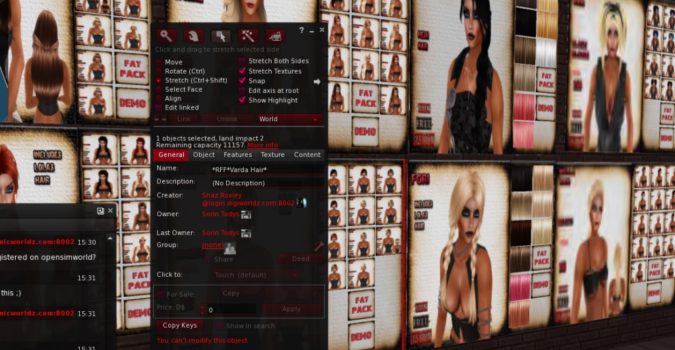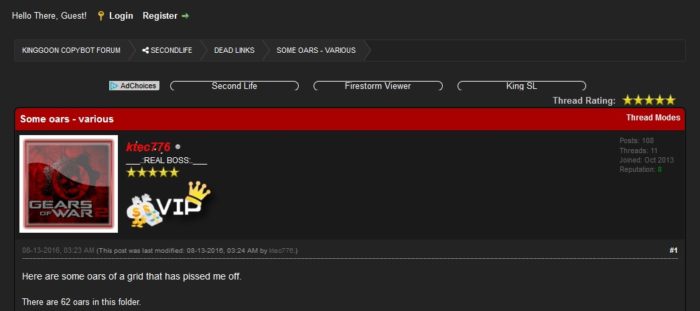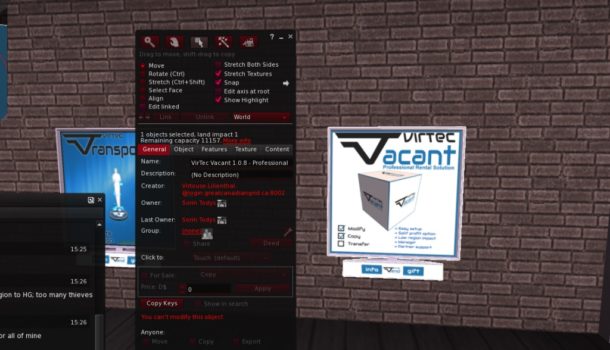Grid owners, content creators, and other members of the OpenSim community are working to solve a serious case of alleged content theft that surfaced recently on the Alife Virtual grid and may involve several other grids and 62 allegedly stolen OARs, or region backup files.
On Thursday, Genesis Metaverse CFO Janet Smolko, also known as Candi Genesis in-world, met with the owner of the VirTec multi-grid vending system and learned that content from her grid was possibly being illegally distributed on Alife Virtual, as she explained in a Google Plus post.

 “As we have never released any OARs to anyone for any reason I immediately went over to verify his statements,” she said. “They had all been accurate. A region created by one of our long time residents was used in Alife without the creator’s or Genesis’ permission.”
Soon afterwards, DigiWorldz owner Terry Ford confirmed in a separate post that his grid’s content was also being illegally distributed there.
Other content creators and community organizers quickly drew attention to the issue, including well-known content creator Linda Kellie and Han Held, who run the OpenSim Everything community. VirTec created a Google Plus collection to present evidence of the problem, on both Alife Virtual and the Brazilian AllCity grid.

Content creator Noxluna Nightfire visited Alife Virtual this week and found content from many creators she knew, creators who were not knowingly distributing their content on that grid.
“I TP’ed to various sims and was completely stunned to find what appeared to be the whole stores of certain Second Life creators,” she said.
For creators, there’s also an extra worry, she said. It’s not just that their creations are being distributed illegally. It’s that they may have used content from other sources as part of their products, and the license they signed requires them to protect that other content. For example, she found items from one creator who uses third-party full-perm content — those items can be tracked back.
“This could conceivably cost her those license — and a crap ton of money,” she said. “Very not cool.”
Alife Virtual promises swift action
In response to the allegations, Alife Virtual has taken all involved servers offline for a content review, grid owner  Sorin Todys told Hypergrid Business.

“All servers are stopped and will be evaluated one by one with region owners,” he said. “If needed, we will delete everything owners say it was not done by them. I think that is the most drastic measure that could be taken. I apologize in advance to all users who will suffer unfairly.”
The evaluation has already started and will take about a month to complete, according to Todys.
“It will be internal evaluation with Alife region owners and our team,” he said. “Anyone outside is welcome anytime.”
But Alife Virtual’s reaction to this incident has not been completely positive. At first, content creators said that they were getting a negative reaction from the grid, or were even banned from visiting the grid altogether.
There have been other problems with the grid, as well. Even though it reports more than 1,000 active monthly users on its stats page, there have been repeated problems accessing their stats on a regular basis, or getting any explanation from grid owners about stats-related issues. As a result, Hypergrid Business has not been publishing its active user stats for about a year. Similar problems have caused the grid not to be included in Magnuz Binder’s grid stats.
In addition, its Google Plus page shows no activity, and its Facebook page just runs the same ad once a month.
62 OARs still being distributed
Alife Virtual isn’t the only grid caught up in this illegal content scandal.
That’s because the main problem is that the source of the infringing content seems to be a set of allegedly stolen OAR files — and those files are still out there.
An OAR file is a backup of an entire region, including all objects on that region and their scripts. So if proprietary vending machines were on a particular region, the OAR export of the region would include those machines and their scripts, and the person uploading that OAR would be able to set themselves as the creator of those machines or any other content in that OAR file.
The OARs were reportedly taken from several grids, including Genesis Metaverse, and distributed on a site well-known for distributing stolen content.
As of this writing, the OAR files were still up on the site and available for download.

According to Nightfire, members of this site not only share stolen content, but also tips and tools about how to steal the content in the first place.
“It’s a very slimy place,” she told Hypergrid Business.

AviWorldz denied wrong-doing. The grid was taken down couple of months ago and it does not have any infringing content,  AviWorlds owner Alex Pomposelli told Hypergrid Business.
“I just now found out what happened and this really has nothing to do with me,” he said. “The evidence is pointing to another person whom I did employ but fired him as soon as I saw trust was no longer present. I had no idea of what had happened and just found out.  I hold no unauthorized OARs from anyone.”
He said that he is firmly opposed to content theft.
“I am against that practice and if anyone came to me and pointed at any content illegally brought into AviWorlds, I delete it on the spot and purge it from the database,” he said.
The AviWorlds terms of service also requires users to agree that no content owned by other creators should be brought into their grids and that if such a thing happens, it would be removed.
It’s unclear to what extent AviWorlds would be liable for actions by a former employee if that employee was acting on his own.
Genesis Metaverse, one of the affected grids, said that they are pursing legal action both in the U.S. and in the U.K., and posted an official statement on their Facebook page.
According to grid owner Cliff Hopkins, the AviWorlds employee copied the grid’s content last summer, while the grid was being hosted by AviWorlds through its OpenSim hosting service, Avi-Labs.
The employee “copied all Genesis Metaverse OARs …Â and made them publicly available on a public forum free of charge without our consent of knowledge and used the excuse ‘we pissed him off’ as a reason to why he made them public and stole ours and our residents content and creations,” Hopkins wrote.
These OARs have since been found on seven different grids, he added, and he has sent take-down notices to all those grids.
“Our lawyers will also be chasing this up to make sure these grids have responded to our legal request to remove our content,” he said. “If they refuse then we will go straight to their host.”
Under U.S. laws, and the laws of almost all other countries, content-sharing platforms like social media sites — or OpenSim grids — where random users can upload random content have a “safe harbor” under which they are exempt from copyright lawsuits as long as they promptly take down offending content. Otherwise, these platforms would be getting hit by lawsuits constantly, and would all quickly go out of business. But if a site or grid fails to take down infringing content quickly, it may lose its protected “safe harbor” status. The same applies to the data centers that host the grids, and to the domain registrars where their URLs are registered.
As a result, grids that do not comply with the US DMCA or the similar laws enacted in other countries can quickly disappear from the Internet.
“We would also like to apologize to all those affected by this theft in 2016 and rest assured we are now hosted with a much better company who actually have morals and respect our users creations,” Hopkins said.
Earlier this month, Genesis Metaverse decided to host its grid with DigiWorldz. AviWorlds itself followed suit yesterday.
The story with VirTec
Virtouse Lilienthal discovered some strange numbers when checking his VirTec vending machine records. We had actually asked him for the records to do a latest report. He thought he had made a mistake by replacing one grid name with another, but revealed otherwise after further investigations involving checking the name of all registered grids, vendors, owners of the vendors as listed and locations of those vendors.
“I started listing those vendors in my database and I found that there were vendors which had my products in them, but were owned by completely different avatars,” he said.
That’s when he discovered offending content on Alife Virtual, including a region that was originally hosted at Genesis Meterverse. He found his items on sale and having a different owner, Sorin.
“That is the moment when I stumbled first across the Alife Virtual region which contained the exact replica of a region I remember being at the Stargazer Genesis grid before the owner left and the region was shut down (I actually moved to another region on that grid at that time). ”
He then explained the issue to Genesis Meterverse and they accepted to visit the region and so confirmed the issue together.
VirTec, the vending system company, does not, on its own, make content for sale, but it does own the rights to its vending machines. If someone else takes over those machines, it could create security issues for the vending network, or allow unscrupulous users to sell stolen content.

Fortunately, there is no evidence that the VirTec vendors were used on Alife Virtual to sell infringing content, company owner Virtouse Lilienthal told Hypergrid Business.
However, he was able to find copies of his vending machines with unapproved owners on the Alife Virtual grid and with other users — including some that had been rebranded.
Advice to grid owners and content creators
Grid owners need to know their residents, act immediately if something is reported and it is found to be true, said Smolko.
“Investigate personally, make the time,” she said. “Spend the money to protect your residents and their creations. They spend hours, days, sometimes months creating a single item, it’s your duty to keep that protected.”
And creators need to be responsible in protecting their content, she added.
Creators need to know well their grids, grid owners and staff and if they are unavailable, give canned responses, disregard creators’ fears or issues, then it means they will likely not protect creators and the items they create, and so it is good for creators to find a better home to host their creations, she said.
Grids also need a strong policing policy to end content infringement, said AviWorlds’ Alex Pomposelli.
“The only way to prevent people from taking or using stolen material is to police and enforce the terms and conditions,” he said. “You see it — you take it down.”
Grids should also make it as easy as possible for creators to file take-down requests, with easy-to-find contact information. Don’t make content creators chase you down in-world.
Kitely, for example, has a simple take-down form on their website which should serve as a model to all grids.
By making the process quick and easy, creators won’t be tempted to go elsewhere to seek redress — such as social media and other communication channels, or filing take-down requests with hosting companies and registrars. The first option could seriously damage a grid’s reputation. The second would put it out of business immediately.
Grids, even those not based in the United States, should also register with the U.S. Copyright office if they distribute content from U.S. creators, or have users who live in the U.S. Registration, which costs a one-time fee of $105, is the best protection against lawsuits by Americans.
Kitely, InWorldz, DigiWorldz, OutWorldz and many other grids are registered.
- OpenSim active users hit all-time-high for the holidays - December 15, 2023
- OpenSim user activity ramping up for the holidays - November 15, 2023
- OpenSim land area at a new high as grids prep for holidays - October 15, 2023
